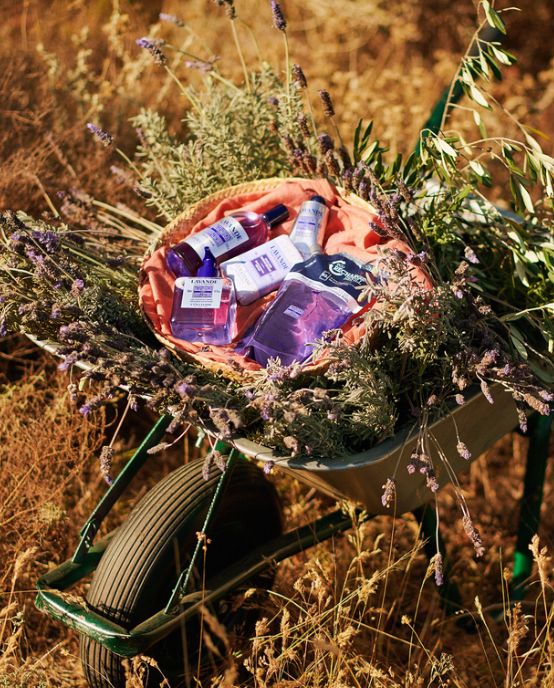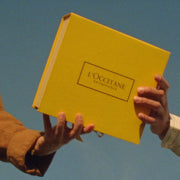
Sustainable Sourcing
" We are very involved at ground level and know our raw products and our suppliers inside out. It demonstrates our credibility throughout the entire process, from the basic seeds right through to the finished products."

BUILDING LONG-TERM PARTNERSHIPS BASED ON TRUST & RESPECT
L'OCCITANE works directly with over 130 French farmers and 10.000 pickers - from the immortelle fields of Corsica to the lavender fields of Provence - to ensure that the ingredients we use are of the highest quality and sourced as sustainably as possible.
OUR FOUR COMMITMENT PILLARS
The L’OCCITANE brand sees nature as its model and draws inspiration from the natural properties of plants to drive innovation. We are dedicated to developin long-term partnerships with our producers and prioritise short, local integrated channels when sourcing our key ingredients.
-

Traceability
We strive to purchase local produce whenever possible, in order to reduce our carbon footprint and support local business, for the benefit of the social fabric of the region. We give priority to small, integrated networks, to bring added value to the producer and have complete control over the traceability of extracts, from the seeds right up to the finished product.
-

Sustainability
Our work requires respect for both man and the environment. We make no compromises with regard to the protection of endangered species or the skills of communities.We do not patent ways of using ingredients that are based on triditions (no biopiracy), but carry out effectiveness tests and work on combinations of ingredients to meet cosmetic needs.
-

Fairness
For our key ingredients, we build real partnerships that are strengthened, whenever possible, by multi-year contracts with our producers. These contracts guarantee them a minimum purchase volume, which ensures that they have a reliable, lasting outlet for their produce, at a price that is agreed by all parties. The fairness of our partnerships cal also be found in our North-South trade. Several of our supply chains (shea butter, argan oil, orange blossom floral water) are fair trade approved and we donate a percentage of the purchase price of the raw material to local development projects.
-

Quality
The growing, harvesting, drying and storage conditions all have an impact on the purity of the plant materials. We guarantee their quality through specifications that are drawn up with our analytical, quality and regulatory departments, and with the help of our technical partners on the ground.
Our key ingredients are, for the most part, organically derived, to guarantee the absence of chemical inputs. The harvesting of wild plants is governed by sustainable harvesting guidelines, to protect the integrety and habitat of these plants.
-
Traceability
30 TRACEABLE INGREDIENT SUPPLY CHAINS WITH 50% ORGANIC CERTIFICATED
-
Partners
80 PARTNERSHIPS WITH FARMERS
-
Pickers
10,000 PICKERS WORKING FOR L'OCCITANE
INGREDIENTS TRUE STORY
At L'OCCITANE, we strive to use high-quality, traceable ingredients of natural origin. We use over 200 plant-derived ingredients, a quarter of them organic certified, which are carefully selected for their effectiveness and their ability to give your skin the elements it needs to look beautiful. We therefore systematically give priority to natural ingredients whenever possible. Discover L’OCCITANE’s most beloved products, made with the finest ingredients and 40 years of traditions. Provençal Almond, West Africa Shea butter… all ethically sourced!
Animal Testing
The L’OCCITANE Group has been against animal testing for more than 40 years and we have never tested our products, active ingredients or raw materials on animals at any point in the product development or manufacturing process.
The Group is fundamentally against animal testing of beauty products on a worldwide basis. In China, where our products are retailed, the local Chinese authorities request that some cosmetic products sold on the Chinese market are tested. They view it as the best way to safeguard consumer safety in China.
We do not conduct these tests. They are done by Chinese laboratories that have been approved by local authorities on a limited animal panel.
To move things forward, the cosmetics industry is developing its relationship with the Chinese authorities with the clear objective of bringing animal testing for beauty products to a definitive end. The industry has engaged with the relevant authorities and animal rights NGOs so as to highlight alternative techniques that are being used in Europe, where animal testing has now been banned.
This constructive dialogue has led to a series of advances in Chinese regulation, including a decision in June 2014 to end this type of testing on so-called “ordinary cosmetics” that are manufactured and packaged locally (shampoo, perfume etc.). Another major milestone was made in November 2016 when the CFDA (China Food and Drug Administration) approved the use of a non-animal test for safety assessment of certain cosmetic ingredients. Currently the NIFDC (National Institute for Food and Drug Control) is considering acceptance of other alternatives to animal testing (AAT). To further demonstrate our commitment to ending animal testing, the L’OCCITANE Group has partnered with the Institute for In Vitro Sciences (IIVS). The IIVS has an active program in China dedicated to promoting the use and regulatory acceptance of AAT. More information about this program can be found on the IIVS website.
We remain convinced that this open dialogue with Chinese organisations will further influence Chinese regulation and put an end to animal testing once and for all.
Thank you for your interest and we hope this statement has clarified our position.







